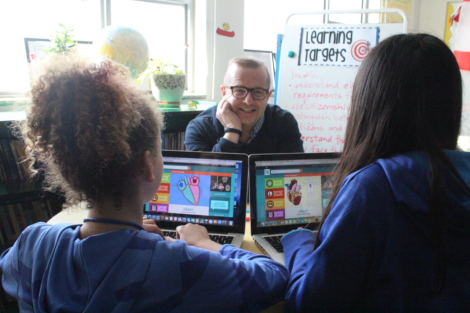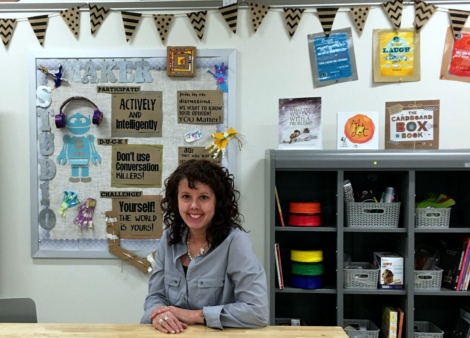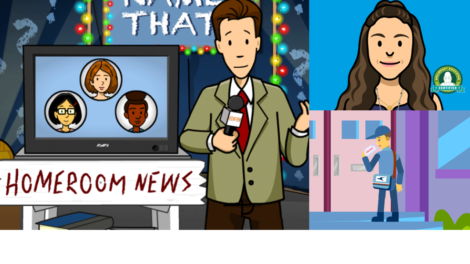
In the mind of a CBE: How to survive a glut of (dubious) media …
Posted by Jessica Millstone on
Welcome back to Davey Neill, our February Certified BrainPOP Educator of the Month! Davey shares with us some of the ways he uses BrainPOP to sort through and provide accurate information to his students, even when he (occasionally) doesn’t have all the answers to all their questions ….
Growing up in Canada in the early 1980s, I was raised in a household where print media was never in short supply. As long as I could remember, at any given time, my parents had subscriptions to two daily newspapers along with annual subscriptions to Time, Newsweek, National Geographic, Sports Illustrated and BusinessWeek. The magazines were always a particular favourite of mine as the gloss and sheen of the paper made their contents seem more urgent, relevant, and to my mind, cosmopolitan. Every Monday, our family would receive the equivalent of half a phonebook of new print media at our doorstep. Beginning around the age of eleven, I remember coming home from school and sitting at the kitchen table and pouring over the new trove of materials. It was the Golden Age of media as I knew it and while my parents were pleased that they had raised a voracious reader who shared their enthusiasm for reading, there was little that could have prepared them for the onslaught of what was to come- the relentless, unending, borderline sarcastic, litany of questions.
With every issue that came to our doorstep, a new barrage of queries and curiosities emerged that always demanded clarity and context. My parents and teachers gave their level-best effort using their intellectual resources to explain the complexities of everything I wanted to know about, and to be clear, I wanted to know about everything. Also, it was the eighties. Hot-button topics included AIDS, the Cold War, and Reaganomics. Inevitably, questions led to more questions. Today, I could not be more grateful to my parents and to so many of my teachers who took the time to help me understand the affairs of the world using language and could understand. They all did their part to help me turn information into knowledge and weave ideas across disciplines. Those were some of the best teachable moments of my life.
I share this remembrance of a bygone era to commemorate my own journey as a learner and what it means to me to learn and teach in the age of BrainPOP.
As we head into the age of the 5G telecom networks, driverless automobiles and machines capable of a trillion floating point operations per second, many like to celebrate how technology has transformed what it means to learn. Students having ready-access to the sum total of all recorded facts, fully indexed and at fingertip reference, remains a phenomenal human accomplishment and one worthy of marvel. I once imagined how maybe I could have spared my parents and teachers much of the agony of my inquisitions and endless entreaties to explain everything. However, as wonderful as the digital age has been in so many ways, there remains no reliable map or GPS to navigate this brave new world. If this age has taught us anything, data and facts are not synonymous with knowledge, and despite our efforts to do so, the internet is not curated in a friendly way. For the young learner, it really can be a jungle out there.
For my own students, growing up in the maddening abyss of today’s digital landscape of internet ubiquity and pocket supercomputing, BrainPOP offers students a sane, safe, and reliable inlet away from the chaos. When my students go to BrainPOP, there’s a knowingness in the product that assures them what they are getting is safe, researched and reliable. There’s also a comfort in the familiarity of Tim’s voice and the repartee of Moby’s beeps that reassures learners there is a consistence of sincerity and warmth traceable throughout every movie.
Since discovering it as an educator just over a decade ago, BrainPOP has been my single-most dependable interactive tool for teaching new topics and disciplines to my learners. With every BrainPOP movie, there is an acute sense of precisely where to begin and what knowledge and awareness the learner should come away with by the end, incorporating content that is relevant, entertaining, and always age-appropriate. Each BrainPOP movie is so lovingly constructed with the learner in mind, with all the relevant and objective information necessary to draw conclusions, the person watching feels personally connected to what has been shared. My students don’t just like learning from Tim and Moby — they love it.
Today, my students, much like my ten-year old self, are taking in vast amounts of media each day, mostly in ways unimagined only a generation ago. A child’s capacity to wonder about the marvels and mysteries of the world is an absolutely precious gift. And like me at their age, they urgently want to make sense of the affairs of the world and how they are arranged because they also know they matter. For educators and parents, this means two things: that we’re responsible to do our best to honor their earnest lines of inquiry as much as we can; and we need to be ready to admit when we don’t have all the answers. In times like these, it’s good to know there’s BrainPOP for all of us.














